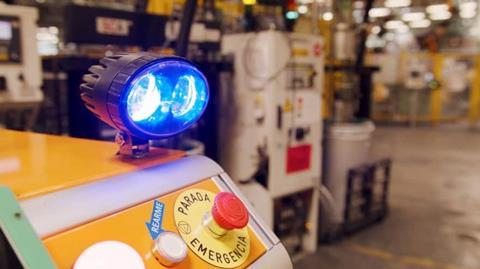
Ford is trialling an autonomous robot to deliver parts at its assembly and stamping plant in Valencia, Spain, with a view to using the machine at other factories.
Nicknamed Survival because of its ability to adapt to its environment, the self‑driving robot delivers spare parts and welding material around the plant. The machine can also avoid unforeseen objects, change its route if obstructed and stop whenever necessary.
Developed by Ford engineers, it is the first of its kind to be used in the company’s European facilities.
“We programmed it to learn the whole of the plant floor so, together with sensors, it doesn’t need any external guides to navigate” said engineering manager Eduardo Garcia Magraner at the Valencia plant.
“When it first started you could see employees thinking they were in some kind of sci-fi movie, stopping and staring as it went by. Now they just get on with their jobs knowing the robot is smart enough to work around them.
“It’s been on trial for almost a year now and has performed faultlessly to date. It’s become quite a valuable team member. Hopefully we can put it into full-time use shortly and expand into other Ford facilities.”
Part of the process
Survival delivers parts and material to different stations around the plant needed for the production of the Kuga, Mondeo and S-MAX models.
“The robot does not replace employees but can save up to 40-employee hours every day by taking over this role, allowing operators to use their time on more complex tasks,” Ford added.
The robot is equipped with an automated shelf that has 17 slots to hold materials of different weights and sizes. To avoid errors, the opening and closing of these slots is automated, meaning operators in each area only have access to the materials assigned to them.
Ford commented that though autonomous vehicles are still a few years away, Survival is showing what is already possible. It is also one of a series of robots employed in Ford’s European plants to aid production.
Since 2016, workers at the Fiesta assembly line in Cologne, Germany, have used collaborative robots, known as co-bots, to help fit shock absorbers.

























![Global[1]](https://d3n5uof8vony13.cloudfront.net/Pictures/web/a/d/s/global1_726550.svgz)













No comments yet